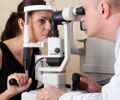Highlights:
- Women are at higher risk than men for developing most eye diseases
- One in four women in the developed world have not had an eye examination in the last 2 years
- Most women forego eye exams citing cost factor
- The month of April is dedicated to Women’s Eye Health and Safety
Read More..
Visual Impairment in Women – The Causes
According to the National Eye Institute, as of 2015, more than 4.4 million Americans above 40 years of age suffer from blindness and other forms of visual impairment. Out of this the majority are women.The story is similar in other parts of the world including largely populated countries like China and India. In some of the developing countries women seldom visit a doctor, leave alone getting their eyes checked regularly and this is due to the high cost of medical care that is not affordable. In fact the theme for the World Health Day of 2019 is providing universal healthcare by 2030.
Why women have more problems with Vision?
Other than the longer life expectancy and hormonal issues, factors like age, smoking, poor nutrition and obesity will also cause visual impairment. Women have higher rates of cataract, glaucoma and age-related macular degeneration and also higher prevalence of dry eye. Pregnancy and menopause may also cause changes in vision. Surge of hormones during pregnancy may lead to conditions like dry eye, refractive errors, diabetic retinopathy, retinal detachment due to high blood pressure, and puffy eyelids. Pregnant women should be cautious and look for symptoms that may cause permanent damage. Additionally women also tend to get treated more for various forms of cancer which again may impair the vision.Women are also more prone to autoimmune diseases like lupus, Sjögren’s syndrome and hyperthyroidism which may also affect their vision, according to the American Academy of Ophthalmology.
Protecting the Vision – Recommendations
The following are a few recommendations to maintain good eye health and prevent vision loss in the future:- Get your eyes examined regularly
- Quit smoking
- Maintain blood sugar and blood pressure levels
- Discuss with your doctor about taking nutritional supplements
- Stay protected in sun with the help of sunglasses or hats
- Learn if there is a history of eye disease in the family
- Practice a safe use of eye cosmetics
- Practice safe use of contact lenses
- Pregnant women, particularly those with diabetes and women going through menopause should be aware that they might face vision impairment and should seek help
Barriers to Seeking Treatment
Though most of the eye diseases do not have cures, early detection and prevention are possible and the effects can be significantly lessened. An online survey conducted by Prevent Blindness has found that one in four women have not got their eyes examined for two years. The reasons cited by them include cost, transportation issues and not being able to take time off to visit a doctor.Additional findings from the survey that cause a great deal of concern include:
- Lack of awareness - Less than 10 percent number of women understand that they are at a higher risk of vision loss than men
- Almost 86 percent of the American women think both women and men have equal risks
- Around 5 percent assumed that men are at a greater risk
What Should You Do?
Healthy vision should not be taken for granted. It is recommended that all women at least by the age of 40 should start undergoing comprehensive eye exams. Eye exams should become a routine at the earliest possible. Treatment and care routine recommended by the specialist should be diligently followed. Dilated eye exams should be done to detect certain conditions like macular degeneration.Asian and Hispanic women are more prone to dry eye and should have a discussion with their specialist regarding care and treatment for the syndrome. Pregnant women, particularly those diagnosed with diabetes, should consult their eye doctor regularly without fail.
A diet that is rich in vitamin C, vitamin E, beta carotene, lutein, zeaxanthin, zinc and omega-3 fatty acids is recommended. Those diagnosed with vision problems should discuss the recommended diet plan with the consulting doctor.
This April, it is time for all women to know the facts, understand the risks and seek guidance appropriately. Women all over the world must be encouraged to get eye exams regularly in order to prevent total blindness in the future.
Reference:
- Because Women Have Unique Vision Issues, Prevent Blindness Declares April as Women’s Eye Health and Safety Month - (https://www.preventblindness.org/women-eye-health-2019)
Source-Medindia















